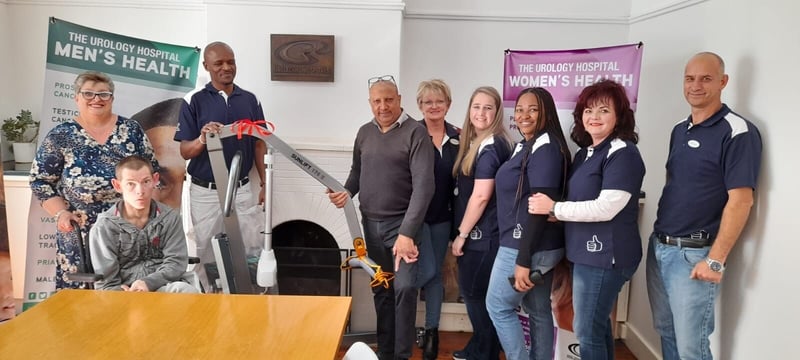Supporting the disabled youth in South Africa
Written by: We Rise Communications Save to Instapaper
The Urology Hospital donated a Sunlift e175 Hydraulic Hoist to the Joan Mary Care Centre, Pretoria, an essential assistive product* for an often-overlooked disabled community.
“Disability affects the lives of many. Globally, over 2.5 billion people need assistive products* such as mobility aids that will give them much deserved dignity and confidence, whilst assisting caregivers. A hoist will make a significant difference in the lives of individuals at the care centre as a long-term, safe solution that will allow caregivers to move disabled kids around easily without any harm.”, says Malcolm Anthony, CEO of The Urology Hospital.
The centre, established by Elize Edgerton in 2014, for those with multiple disabilities, currently houses and supports ten disabled children and adults. Elize and her husband converted their home into the care centre which runs as a fully registered NPC.
“We’re very grateful for the support we’ve received so far and what was accomplished over the last eight years”, says Elize Edgerton, CEO of Joan Mary Care Centre. “There are ways you can support the Joan Mary Care Centre and disabled community as we require financial assistance, consumables, assistive products* and other things not available within our budget.”
Contact the Joan Mary Care Centre on This email address is being protected from spambots. You need JavaScript enabled to view it. or 073 727 6148/084 061 8449.
Images attached: The Urology Hospital staff handing over the Sunlift e175 Hydraulic Hoist to Joan Mary Care Centre, Pretoria.
Note to editors: assistive products*
Assistive technology is an umbrella term for assistive products and their related systems and services. Assistive products can enhance performance in all key functional domains such as mobility, hearing, self-care, vision, cognition and communication. They may be physical products, such as wheelchairs, prosthetics or spectacles, or digital software and apps. They may also be adaptations to the physical environment, for example portable ramps or grab-rails.
People in need of assistive technology include people with disability, older people, people with communicable and noncommunicable diseases including neglected tropical diseases, people with mental health conditions, people with gradual functional decline or loss of intrinsic capacity and many people affected by humanitarian crises.
The Urology Hospital, Pretoria
The Urology Hospital, Pretoria, is the only urology centre of excellence in Africa. With more than 20 urologists under one roof, using the latest in highly specialised technology as well as specialised urology trained nursing staff, it offers unparalleled expertise in its field. In addition, the hospital maintains its association with the academic world to ensure ongoing research, medical education and training and development in the field of urology.
The hospital prides itself on being at the forefront of technology. It was the first hospital in South Africa to perform robotic surgery, implement a robotic pharmacy picking system and now has one of only a handful of 3D laparoscopic surgical units in South Africa. The hospital has undergone major renovations and now offers 127 beds and eight theatres.
The Urology Hospital not only cares about patients and staff, but also for the community, undertaking numerous Corporate Social Investment initiatives throughout the year. The hospital and staff work together to assist selected charities, including donations to The Clothing Bank, uniforms for Sunnyside Primary School and stationery for Balebogeng Primary School.
Get new press articles by email
Latest from
- Over Half a Million South Africans Scammed — DSA Warns of Rising Fraud Crisis
- DSA Members offer South Africans a Legit Economic Solution while Fraud & Scams Surge
- Fight South Africa’s Most Common Male Cancer - Know Your Prostate, It’s Worth The Check
- Women’s Month - Urology Hospital Puts Women’s Silent Struggles in the Spotlight
- Youth Unemployment Persists—Entrepreneurship is South Africa’s Urgent Solution
- Urology Hospital Performs Free Procedures for Public Hospital Patients this Mandela Month
- Fighting the ‘Silent Disease’–Urology Hospital’s Free Workshop Tackle’s Chronic Kidney Disease
- Tackling SA’s Unemployment - Key to Economic Growth and Equality – DSA
- Urology Hospital Tackles Myths and Prioritises Women’s Urological Health at Wellness Day
- Urology Hospital Tackles Myths and Prioritises Women's Urological Health at Wellness Day
- Urology Hospital - Doctors collaborate with African Synergy Health to perform free robotic prostatectomies this Mandela Day
- World Kidney Day - Urology Hospital to offer free kidney health screening
- SA matriculants, graduates brace for employment struggle - DSA offers new opportunities
- Indebted South Africans face financial ruin amid interest rate hike and growing risk of scams
- The Urology Hospital partners with African Synergy Health to perform life changing procedures
The Pulse Latest Articles
- Game On, Gloot Girls! Get Ready For The Strongest, Sassiest 10s Series Yet. (February 3, 2026)
- Opinion Piece: Workplace Trends For 2026 And Beyond (February 3, 2026)
- Bite Sized Wellness, Big Time Benefits (January 28, 2026)
- Opinion Piece: The Power Of Engagement Surveys (January 26, 2026)
- Meet Gloot Energy: Power Made For Women (January 22, 2026)
